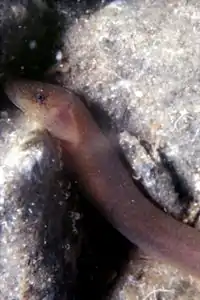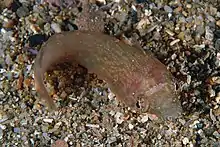Schildfische
Die Schildfische (Gobiesocidae), auch Schildbäuche oder Ansauger genannt, sind eine Familie aus der Gruppe der Barschverwandten (Percomorphaceae). Sie sind am nächsten mit den Schleimfischartigen (Blenniiformes) verwandt.[1] Die über 170 Arten in etwa 50 Gattungen leben in gemäßigten, subtropischen und tropischen Meeren, wenige auch im Süßwasser und Brackwasser.
| Schildfische | ||||||||||||
|---|---|---|---|---|---|---|---|---|---|---|---|---|
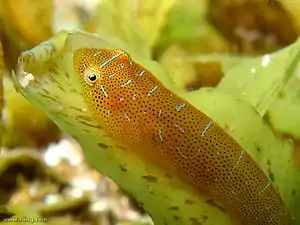
Cochleoceps orientalis | ||||||||||||
| Systematik | ||||||||||||
| ||||||||||||
| Wissenschaftlicher Name | ||||||||||||
| Gobiesocidae | ||||||||||||
| Bleeker, 1860 |
Merkmale
Es handelt sich um grundelähnliche, stark spezialisierte Tiere. Die Bauchflossen sind zu einer Saugscheibe, mit der sich die Fische am Untergrund festhalten können, verwachsen. Die Haut hat keine Schuppen, aber eine dicke Schleimschicht. Eine Schwimmblase fehlt. Zu erwähnen wären noch die Genitalpapille der Männchen und das Fehlen von Basi- und Orbitosphenoid im Schädel. Die Kiemen am vierten Bogen fehlen zur Hälfte oder ganz.
Meist werden die Fische nur um die fünf Zentimeter lang, einige nur 2–3 Zentimeter, die größte Art (Chorisochismus dentex) kann 30 Zentimeter lang werden. Die Arten der Gattung Alabes (Unterfamilie Cheilobranchinae) sind aal- („Küstenaale“) oder eigentlich (wegen ihrer geringen Größe) wurmförmig, ihr Saugnapf ist klein oder verschwunden.
Lebensweise
Schildfische bewohnen meist Flachgewässer mit felsigem Grund und Algenbewuchs oder leben in Seegraswiesen. Nur wenige Arten kommen in Korallenriffen vor. Einige Arten leben auch in Symbiose mit Wirbellosen, so der Haarstern-Schildbauch (Discotrema crinophila) und der Seeigel-Schildbauch (Diademichthys lineatus). Beim Seeigel-Schildbauch, der zwischen den Stacheln von Diadem-Seeigeln (Diadema sp.) lebt, hat man allerdings festgestellt, dass er die Füßchen der Seeigel frisst. Somit ist es wohl eher Parasitismus.
Innere Systematik
Die Schildfische werden in neun Unterfamilien unterteilt.[2]
- Unterfamilie Cheilobranchinae
- Gattung Alabes
- Alabes bathys Hutchins, 2006.
- Alabes brevis Springer & Fraser, 1976.
- Alabes dorsalis (Richardson, 1845).
- Alabes elongata Hutchins & Morrison, 2004.
- Alabes gibbosa Hutchins & Morrison, 2004.
- Alabes hoesei Springer & Fraser, 1976.
- Alabes obtusirostris Hutchins & Morrison, 2004.
- Alabes occidentalis Hutchins & Morrison, 2004.
- Alabes parvula (McCulloch, 1909).
- Alabes scotti Hutchins & Morrison, 2004.
- Alabes springeri Hutchins, 2006.
- Gattung Aspasma
- Aspasma minima (Döderlein, 1887).
- Gattung Aspasmichthys
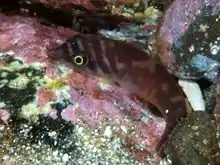 Aspasmichthys ciconiae
Aspasmichthys ciconiae- Aspasmichthys ciconiae (Jordan & Fowler, 1902).
- Gattung Barryichthys Conway et al., 2019.[3]
- Barryichthys hutchinsi Conway et al., 2019.
- Barryichthys algicola Conway et al., 2019.
- Gattung Cochleoceps
- Cochleoceps bassensis Hutchins, 1983.
- Cochleoceps bicolor Hutchins, 1991.
- Cochleoceps orientalis Hutchins, 1991.
- Cochleoceps spatula (Günther, 1861).
- Cochleoceps viridis Hutchins, 1991.
- Gattung Erdmannichthys[4]
- Erdmannichthys alorensis Allen & Erdmann, 2012.
- Gattung Lissonanchus
- Lissonanchus lusheri Smith, 1966.
- Gattung Parvicrepis
- Parvicrepis parvipinnis (Waite, 1906).
- Gattung Pherallodichthys
- Pherallodichthys meshimaensis Shiogaki & Dotsu, 1983.
- Gattung Alabes
- Unterfamilie Chorisochisminae
- Gattung Chorisochismus
- Chorisochismus dentex (Pallas, 1769).
- Gattung Eckloniaichthys
- Eckloniaichthys scylliorhiniceps Smith, 1943.
- Gattung Chorisochismus
- Unterfamilie Diademichthyinae Whitley, 1950 (Syn.: Aspasminae)
- Gattung Diademichthys
- Diademichthys lineatus (Sauvage, 1883).
- Gattung Lepadichthys
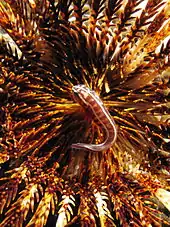 Lepadichthys lineatus
Lepadichthys lineatus- Lepadichthys akiko Allen & Erdmann, 2012.
- Lepadichthys bilineatus Craig et al., 2015.
- Lepadichthys bolini Briggs, 1962.
- Lepadichthys caritus Briggs, 1969.
- Lepadichthys coccinotaenia Regan, 1921.
- Lepadichthys ctenion Briggs & Link, 1963.
- Lepadichthys erythraeus Briggs & Link, 1963.
- Lepadichthys frenatus Waite, 1904.
- Lepadichthys lineatus Briggs, 1966.
- Lepadichthys minor Briggs, 1955.
- Lepadichthys sandaracatus Whitley, 1943.
- Lepadichthys springeri Briggs, 2001.
- Gattung Diademichthys
- Unterfamilie Diplocrepinae
- Gattung Diplocrepis
- Diplocrepis puniceus (Richardson, 1846).
- Gattung Flexor Conway, Stewart & Summers, 2018.[5]
- Flexor incus Conway, Stewart & Summers, 2018.
- Gattung Pherallodus
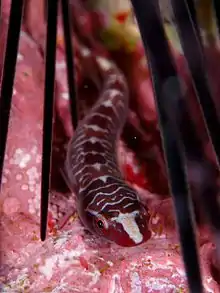 Pherallodus indicus
Pherallodus indicus- Pherallodus indicus (Weber, 1913).
- Pherallodus smithi Briggs, 1955.
- Gattung Diplocrepis
- Unterfamilie Haplocylicinae
- Unterfamilie Gobiesocinae
- Gattung Acyrtops
- Acyrtops amplicirrus Briggs, 1955.
- Acyrtops beryllinus (Hildebrand & Ginsburg, 1927).
- Gattung Acyrtus
 Acyrtus artius
Acyrtus artius- Acyrtus artius Briggs, 1955.
- Acyrtus lanthanum Conway, Baldwin & White, 2014.
- Acyrtus pauciradiatus Sampaio, de Anchieta, Nunes & Mendes, 2004.
- Acyrtus rubiginosus (Poey, 1868).
- Gattung Arcos
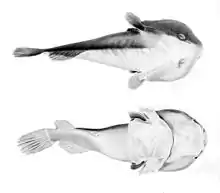 Arcos nudus
Arcos nudus - Gattung Aspasmodes
- Aspasmodes briggsi Smith, 1957.
- Gattung Briggsia
- Briggsia hastingsi Craig & Randall, 2009.
- Gattung Derilissus
- Derilissus altifrons Smith-Vaniz, 1971.
- Derilissus kremnobates Fraser, 1970.
- Derilissus nanus Briggs, 1969.
- Derilissus vittiger Fraser, 1970.
- Gattung Discotrema
- Discotrema crinophilum Briggs, 1976.
- Discotrema monogrammum Craig & Randall, 2008.
- Discotrema zonatum Craig & Randall, 2008.
- Gattung Gobiesox
- Gobiesox adustus Jordan & Gilbert, 1882.
- Gobiesox aethus (Briggs, 1951).
- Gobiesox barbatulus Starks, 1913.
- Gobiesox canidens (Briggs, 1951).
- Gobiesox crassicorpus (Briggs, 1951).
- Gobiesox daedaleus Briggs, 1951.
- Gobiesox eugrammus Briggs, 1955.
- Gobiesox fluviatilis Briggs & Miller, 1960.
- Gobiesox fulvus Meek, 1907.
- Gobiesox funebris Gilbert, 1890.
- Gobiesox juniperoserrai Espinosa Pérez & Castro-Aguirre, 1996.
- Gobiesox juradoensis Fowler, 1944.
- Gobiesox lucayanus Briggs, 1963.
- Gobiesox maeandricus (Girard, 1858).
- Gobiesox marijeanae Briggs, 1960.
- Gobiesox marmoratus Jenyns, 1842.
- Gobiesox mexicanus Briggs & Miller, 1960.
- Gobiesox milleri Briggs, 1955.
- Gobiesox multitentaculus (Briggs, 1951).
- Gobiesox nigripinnis (Peters, 1859).
- Gobiesox papillifer Gilbert, 1890.
- Gobiesox pinniger Gilbert, 1890.
- Gobiesox potamius Briggs, 1955.
- Gobiesox punctulatus (Poey, 1876).
- Gobiesox rhessodon Smith, 1881.
- Gobiesox schultzi Briggs, 1951.
- Gobiesox stenocephalus Briggs, 1955.
- Gobiesox strumosus Cope, 1870.
- Gobiesox varius (Briggs, 1955).
- Gobiesox woodsi (Schultz, 1944).
- Gattung Gouania
- Gouania willdenowi (Risso, 1810).
- Gattung Lecanogaster
- Lecanogaster chrysea Briggs, 1957.
- Lecanogaster gorgoniphila Fricke & Wirtz, 2017.
- Gattung Liobranchia
- Liobranchia stria Briggs, 1955.
- Gattung Nettorhamphos Conway et al., 2017.
- Nettorhamphos radula Conway et al., 2017.
- Gattung Opeatogenys
- Opeatogenys cadenati Briggs, 1957.
- Opeatogenys gracilis (Canestrini, 1864).
- Gattung Posidonichthys
- Posidonichthys hutchinsi Briggs, 1993.
- Gattung Propherallodus
- Propherallodus briggsi Shiogaki & Dotsu, 1983.
- Propherallodus longipterus Fujiwara & Motomura, 2018.
- Gattung Rimicola
- Rimicola cabrilloi Briggs, 2002.
- Rimicola dimorpha Briggs, 1955.
- Rimicola eigenmanni (Gilbert, 1890).
- Rimicola muscarum (Meek & Pierson, 1895).
- Rimicola sila Briggs, 1955.
- Gattung Sicyases
- Sicyases brevirostris (Guichenot, 1848).
- Sicyases hildebrandi Schultz, 1944.
- Sicyases sanguineus Müller & Troschel, 1843.
- Gattung Tomicodon
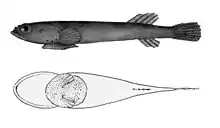 Tomicodon fasciatus
Tomicodon fasciatus- Tomicodon absitus Briggs, 1955.
- Tomicodon abuelorum Szelistowski, 1990.
- Tomicodon australis Briggs, 1955.
- Tomicodon bidens Briggs, 1969.
- Tomicodon boehlkei Briggs, 1955.
- Tomicodon briggsi Williams & Tyler, 2003.
- Tomicodon chilensis Brisout de Barneville, 1846.
- Tomicodon clarkei Williams & Tyler, 2003.
- Tomicodon cryptus Williams & Tyler, 2003.
- Tomicodon eos (Jordan & Gilbert, 1882).
- Tomicodon fasciatus (Peters, 1859).
- Tomicodon humeralis (Gilbert, 1890).
- Tomicodon lavettsmithi Williams & Tyler, 2003.
- Tomicodon leurodiscus Williams & Tyler, 2003.
- Tomicodon myersi Briggs, 1955.
- Tomicodon petersii (Garman, 1875).
- Tomicodon prodomus Briggs, 1969.
- Tomicodon reitzae Briggs, 2001.
- Tomicodon rhabdotus Smith-Vaniz, 1969.
- Tomicodon rupestris (Poey, 1860).
- Tomicodon vermiculatus Briggs, 1955.
- Tomicodon zebra (Jordan & Gilbert, 1882).
- Gattung Unguitrema Fricke, 2014.
- Unguitrema nigrum Fricke, 2014.
- Gattung Acyrtops
- Unterfamilie Lepadogastrinae
- Gattung Apletodon
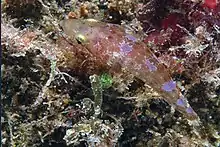 Apletodon incognitus
Apletodon incognitus- Apletodon bacescui (Murgoci, 1940).
- Apletodon barbatus Fricke, Wirtz & Brito, 2010.
- Apletodon dentatus (Facciolà, 1887).
- Apletodon gabonensis ricke & Wirtz, 2018.
- Apletodon incognitus Hofrichter & Patzner, 1997.
- Apletodon pellegrini (Chabanaud, 1925).
- Apletodon wirtzi Fricke, 2007.
- Gattung Diplecogaster
.jpg.webp) Diplecogaster bimaculata
Diplecogaster bimaculata- Diplecogaster bimaculata (Bonnaterre, 1788).
- Diplecogaster ctenocrypta Briggs, 1955.
- Diplecogaster megalops Briggs, 1955.
- Diplecogaster tonstricula Fricke et al., 2015.
- Diplecogaster umutturali Bilecenoğlu et al., 2017.
- Gattung Lepadogaster
- Connemara-Schildbauch (Lepadogaster candolii) Risso, 1810.
- Blaufleckiger Ansauger (Lepadogaster lepadogaster) (Bonnaterre, 1788).
- Lepadogaster purpurea (Bonnaterre, 1788).
- Gattung Apletodon
- Unterfamilie Protogobiesocinae Fricke et al., 2016[6]
- Gattung Gymnoscyphus
- Gymnoscyphus ascitus Böhlke & Robins, 1970.
- Gattung Kopua
- Kopua japonica Moore, Hutchins & Okamoto, 2012.
- Kopua kuiteri Hutchins, 1991.
- Kopua nuimata Hardy, 1984.
- Kopua vermiculata Shinohara & Katayama, 2015.
- Kopua yoko Fujiwara et al., 2018.
- Gattung Lepadicyathus
- Lepadicyathus mendeleevi Prokofiev, 2005.
- Gattung Protogobiesox Fricke et al., 2016
- Protogobiesox asymmetricus Fricke et al., 2016
- Gattung Gymnoscyphus
- Unterfamilie Trachelochisminae
- Gattung Dellichthys
- Dellichthys morelandi Briggs, 1955.
- Dellichthys trnskii Conway et al., 2018.
- Gattung Trachelochismus
- Trachelochismus aestuarium Conway et al., 2017.
- Trachelochismus melobesia Phillipps, 1927.
- Trachelochismus pinnulatus (Forster, 1801).
- Gattung Dellichthys
- incertae sedis
- Gattung Aspasmogaster
- Aspasmogaster costata (Ogilby, 1885).
- Aspasmogaster liorhyncha Briggs, 1955.
- Aspasmogaster occidentalis Hutchins, 1984.
- Aspasmogaster tasmaniensis (Günther, 1861).
- Gattung Conidens
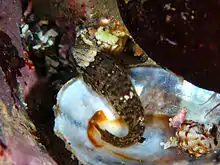 Conidens laticephalus
Conidens laticephalus- Conidens laticephalus (Tanaka, 1909).
- Conidens samoensis (Steindachner, 1906).
- Gattung Creocele
- Creocele cardinalis (Ramsay, 1882).
- Gattung Modicus
- Modicus minimus Hardy, 1983.
- Modicus tangaroa Hardy, 1983.
- Gattung Aspasmogaster
Literatur
- Joseph S. Nelson: Fishes of the World, John Wiley & Sons, 2006, ISBN 0-471-25031-7
Einzelnachweise
- Ricardo Betancur-R, Edward O. Wiley, Gloria Arratia, Arturo Acero, Nicolas Bailly, Masaki Miya, Guillaume Lecointre und Guillermo Ortí: Phylogenetic classification of bony fishes. BMC Evolutionary Biology, BMC series – Juli 2017, DOI: 10.1186/s12862-017-0958-3
- Kevin W. Conway, Cragen D. King, Adam P. Summers, Daemin Kim, Philip A. Hastings, Glenn I. Moore, Samuel P. Iglésias, Mark V. Erdmann, Carole C. Baldwin, Graham Short, Kyoji Fujiwara, Thomas Trnski, Gary Voelker, Lukas Rüber (2020): Molecular Phylogenetics of the Clingfishes (Teleostei: Gobiesocidae) – Implications for Classification. Copeia, 108 (4): 886-906. doi: 10.1643/CI2020054
- Conway, K.W., Moore, G.I. & Summers, A.P. (2019): A new genus and two new species of miniature clingfishes from temperate southern Australia (Teleostei, Gobiesocidae). ZooKeys, 864: 35-65.
- Kevin W. Conway, Kyoji Fujiwara, Hiroyuki Motomura and Adam P. Summers. 2021. Erdmannichthys, A New Genus of Gobiesocidae (Teleostei: Gobiesociformes), and Notes on the Rare Clingfish E. alorensis (Allen & Erdmann, 2012), new combination. RAFFLES BULLETIN OF ZOOLOGY. 69; 428–437
- Kevin W. Conway, Andrew L. Stewart and Adam P. Summers. 2018. A New Genus and Species of Clingfish from the Rangitāhua Kermadec Islands of New Zealand (Teleostei, Gobiesocidae). ZooKeys. 786: 75–104. DOI: 10.3897/zookeys.786.28539
- Fricke, R., Chen, J.-N. & Chen, W.-J. (2016): New case of lateral asymmetry in fishes: A new subfamily, genus and species of deep water clingfishes from Papua New Guinea, western Pacific Ocean. Comptes Rendus Biologies, Dezember 2016. doi: 10.1016/j.crvi.2016.11.002
Weblinks
- Schildfische auf Fishbase.org (englisch)

